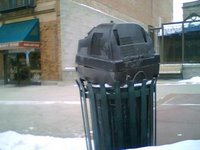Leg. Update: HB 259 & HB 555 Pass the House and more...
http://www2.blogger.com/img/gl.link.gif
Also, don't forget S.A.V.E.'s benefit with Jason DeShaw and the Third Wheel next March 8, S.A.V.E. Day at the Capitol Rotunda on March 9th, and our Plastics Recycling Week starting this Friday.
S.A.V.E. Legislative Update - Halfway through the session:
HB 259, a bill to allow gray water systems in Montana passed out of the House today. Learn more about gray water from previous post at the link above. The bill passed 3rd reading 85 to 14, with 1 excused vote. Representative Ward (R-Helena) co-sponsored HB 259 and expertly presented the practicality and reason for allowing gray water systems in Montana. Also known as Little John of Little John's Septic service, he is most responsible for the bills success and deserves much credit for bringing this conservation measure to Montana. Rep. Ward was excused for health issues and should be foremost in our thoughts while we await his recovery.
HB 555, to create a public education program for recycling and electronic waste disposal passed the House today with a 73 to 27 vote. HB 555 provides funds for D.E.Q. Pollution Prevention (proactive, effective part of D.E.Q. that coordinates state-wide recycling and markets) to run a public awareness campaign on electronic waste. D.E.Q. coordinated several electronics waste events last summer. This bill, HB 258 (below), and our new version of HB 607 (below) are vital to setting up the necessary awareness, incentive, and infrastructure to deal with electronic waste in Montana.
SB 449, setting fuel economy standards for state purchased vehicles, passed the Senate on a voice vote (one or two no votes recorded). The bill requires state vehicles to meet Corporate Average Fuel Economy standards (CAFE), providing the obvious exemptions for emergency and other vehicles. In the last biennium, the state motor pool went 1.33 million dollars over budget due to the increased cost of fuel and parts (due to fuel prices). This helps ensure the state will be prepared for potential spikes in fuel prices and institutionalizes common sense (cents) leadership. The bill also provides for increased carpooling by state vehicles. (on that note, Try Another Way State Employees, should be commended for their on going work doing just that)
*Revenue Bills (have more time before they must be transmitted):
SB 530, to exempt personal production and use of biodiesel for the states road tax, has been assigned to the Senate Taxation Committee. Biodiesel that meets ASTM D6751, the quality standard that biodiesel must meet to be sold in the state, is a proven fuel that performs well in diesel engines at any percentage. Backyard production has the potential to not meet these standards and give the fuel a bad name. By matching the federal exemption from road tax for biodiesel blends, personal use producers will not be deterred from reporting their use to the state. This will help us all make sure biodiesel is made safely and properly, as well as saving grass-roots conservation measures from extra paperwork.
HB 607, to create funds for recycling markets, innovations, and infrastructure from a tipping fee on solid waste, was intentionally tabled in House Natural Resources. S.A.V.E. is working with landfill operators, waste haulers, and other parties most affected by a tipping fee, to create a more palatable bill with another bill draft we had for recycling. The new bill will be presented soon and will create a special fund for recycling grants starting in 2008. A nickel (5 cents) for every ton (2,000lbs) of solid waste buried in Montana will contribute to the fund, coming our to around $65,000. The fund will be controlled by the Pollution Prevention section of Montana D.E.Q., a group that has a proven record of effectively finding innovative and market based solutions to meet the challenges of recycling solid waste in Montana. We see such a fund a vital to ensure effective, state-wide efforts on recycling, especially when dealing with the challenges of electronics waste recycling, helping community glass programs find markets, Household Hazardous Waste, and farm programs for recycling pesticide containers.
HB 258 remains tabled in House Taxation Committee. Given the extra busy schedule around transmittal for non-revenue bills, we have elected to wait a bit longer before bring the bill of for reconsideration. This gives us time to work on more outreach efforts to demonstrate the need to foster an incentive for the proper recycling of electronic waste. See earlier post for more information. Recent discussion of this bill includes "E-waste a growing problem (Helena IR)," a S.A.V.E. hosted forum at the Capitol, this week's Queen City News, and some stories on local news stations.
* A revenue bill affects state revenue, negatively or positively, have a transmittal date of the 60th legislative day. Non-revenue bills must be transmitted this week, by the 45th day.
- Savemobile.org
Labels: alternative energy, conservation, montana, recycling, S.A.V.E.


